
The 2004 Summer Olympics, officially the Games of the XXVIII Olympiad, and officially branded as Athens 2004, were an international multi-sport event held from 13 to 29 August 2004 in Athens, Greece.

Paul Kibii Tergat is a Kenyan former professional long distance runner. He became the first Kenyan man to set the world record in the marathon in 2003, with a time of 2:04:55, and is regarded as one of the most accomplished long-distance runners of all time. Runnerworld called him the "Most comprehensive runner of all time".

The women's marathon at the 2004 Summer Olympics took place on August 22 in the streets of Athens, Greece. These streets were recently painted for the event, which provided an excellent road surface for the athletes. Drawing upon the ancient origins of the race, the marathon began in Marathon, Greece, and eventually ended at Panathinaiko Stadium, the venue previously used for the 1896 Athens Olympics.

The men's 20 kilometres race walk at the 2004 Summer Olympics as part of the athletics program was held through the streets of Athens with the start and finish at the Athens Olympic Stadium on August 20.

Brazil competed at the 2004 Summer Olympics in Athens, Greece, from 13 to 29 August 2004. This was the nation's nineteenth appearance at the Summer Olympics, excluding the 1928 Summer Olympics in Amsterdam. The Brazilian Olympic Committee sent the nation's largest ever delegation in history to the Games. A total of 243 athletes, 124 men and 119 women, competed in 24 sports.

Zersenay Tadese Habtesilase[nb] is a retired Eritrean long-distance track and road running athlete. He held the men's half marathon world record from 2010 to 2018. His bronze medal in the 10,000 metres at the 2004 Athens Olympics made him the first ever Eritrean Olympic medallist, and his 20-km title at the 2006 IAAF World Road Running Championships also made him the country's first athlete to win at a world championship event. He does not use a sprint finish to win races; his strategy relies on a combination of efficient running and fast pace setting.

Kenya competed at the 2004 Summer Olympics in Athens, Greece, from 13 to 29 August 2004. This was the nation's eleventh appearance at the Olympics, except the 1976 Summer Olympics in Montreal and the 1980 Summer Olympics in Moscow because of the African and United States boycott.
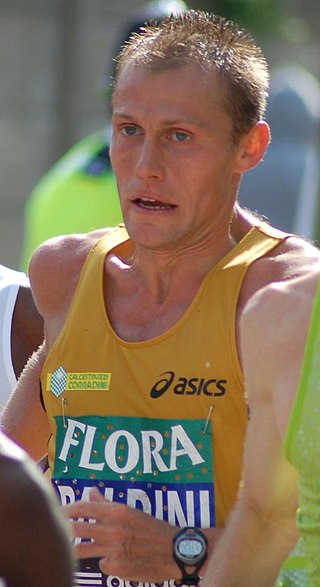
Stefano Baldini is a retired Italian runner who specialized in the marathon. He was the Olympic champion in Athens in 2004 and was twice European champion.

Vanderlei Cordeiro de Lima is a Brazilian retired long-distance runner. He was born in Cruzeiro do Oeste, Paraná. While leading the marathon after 35 km (22 mi) at the 2004 Summer Olympics, he was attacked on the course by Irish former priest Cornelius "Neil" Horan. Following the incident, Lima fell from first to third place, eventually winning the bronze medal. He was later awarded the Pierre de Coubertin Medal for his sportsmanship shown in that race.
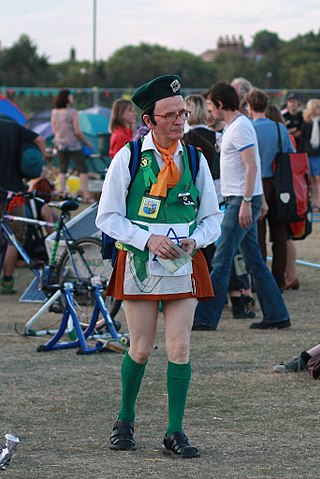
Cornelius "Neil" Horan, sometimes referred to as The Grand Prix Priest, The Dancing Priest, or The Armageddon Priest, is a laicised Irish former Roman Catholic priest who is noted for his interference with the running of the 2003 British Grand Prix and the 2004 Summer Olympics men's marathon in order to promote his religious belief that the end times are near. He was arrested and spent some time in jail in Germany in 2006 when police found out about his plans to stage a pro-Nazi demonstration during the 2006 FIFA World Cup, which included a poster he made praising Adolf Hitler.
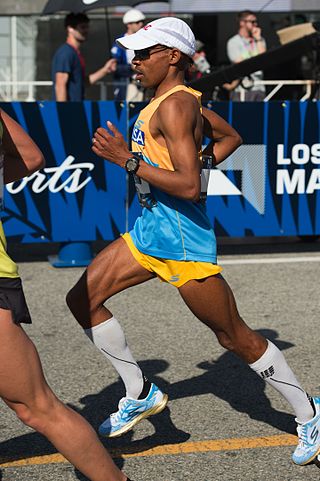
Mebrahtom "Meb" Keflezighi is a retired American long distance runner. He is the 2004 Olympic silver medalist in the marathon and finished in fourth place in the 2012 Summer Olympics. He won the 2009 New York City Marathon on November 1, 2009, and the 2014 Boston Marathon on April 21, 2014, becoming the first American man to win each race since 1982 and 1983, respectively. Keflezighi is a graduate of UCLA, where he won four NCAA championships competing for the UCLA Bruins track and field team. He came in fourth in the 2014 New York City Marathon on November 2, 2014, eighth in the 2015 Boston Marathon on April 20, 2015, and second in the 2016 U.S. Olympic Team Trials to qualify for the 2016 Summer Olympics.

A pacemaker or pacesetter, sometimes informally called a rabbit, is a runner who leads a middle- or long-distance running event for the first section to ensure a high speed and to avoid excessive tactical racing. Pacemakers are frequently employed by race organisers for world record attempts with specific instructions for lap times. Some athletes have essentially become professional pacemakers. A competitor who chooses the tactic of leading in order to win is called a front-runner rather than a pacemaker.

Brazil first participated at the Olympic Games in 1920, after missing the previous five Summer editions. The country has sent athletes to compete in every Summer Olympic Games since then, except for the 1928 Games. As of 2024, Brazilian athletes have won a total of 170 medals in 18 different Summer sports.
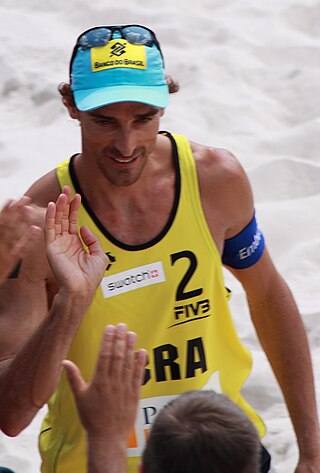
Emanuel Fernando Sheffer Rego is a Brazilian male former beach volleyball player who competed in five consecutive Summer Olympics, starting in 1996. Rego partnered with José Loiola at the 2000 Summer Olympics in Sydney, though they did not medal. He won the gold medal in the men's beach team competition at the 2004 Summer Olympics in Athens, partnering with Ricardo Santos. He won the bronze medal at the 2008 Summer Olympics in Beijing and the silver medal at the 2012 Summer Olympics in London.
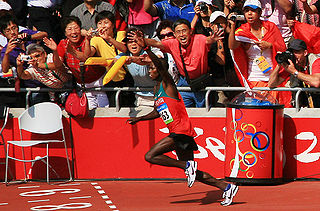
The men's marathon at the 2008 Summer Olympics took place on 24 August at 7:30am in Beijing, ending in the Beijing National Stadium. It was the last time in Summer Olympics history that the start and/or finish of the men's marathon route was located inside the Olympic Stadium. Ninety-five athletes from 56 nations competed. The winner of the event was Samuel Wanjiru of Kenya, who set an Olympic record in the time of two hours, six minutes, and 32 seconds. It was Kenya's first victory in the men's marathon. Morocco won its first medal in the event since 1960, with Jaouad Gharib's silver. Tsegay Kebede of Ethiopia took bronze.

The closing ceremony of the 2004 Summer Olympics was held on August 29, 2004, at 21:15 EEST (UTC+3) at the Olympic Stadium, in Marousi, Greece, a suburb of Athens.

Greece competed at the 2012 Summer Olympics in London, United Kingdom, from 27 July to 12 August 2012. The Hellenic Olympic Committee sent a total of 103 athletes to the Games in London, 65 men and 38 women, to compete in 19 sports. Men's water polo was the only team event in which Greece was represented at these Olympic Games.
Ernest Ndjissipou is a retired Central African long-distance and marathon runner. He represented the Central African Republic in three editions of the Olympic Games, and has also set both a national record and a personal best of 2:18:06 in men's marathon from the 2003 IAAF World Championships in Paris, France.
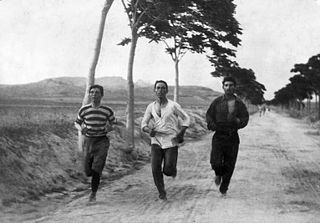
The marathon at the Summer Olympics is the only road running event held at the multi-sport event. The men's marathon has been present on the Olympic athletics programme since the first modern Olympics in 1896. Nearly ninety years later, the women's event was added to the programme at the 1984 Olympics in Los Angeles.

The men's marathon at the 2016 Olympic Games in Rio de Janeiro took place on the Sambódromo on 21 August, the final day of the Games. One hundred fifty-five athletes from 79 nations competed. The event was won by Eliud Kipchoge of Kenya, the nation's second victory in the event in three Games. Feyisa Lilesa of Ethiopia took silver, while Galen Rupp of the United States took bronze. The defending champion going into the marathon was Ugandan Stephen Kiprotich.






















